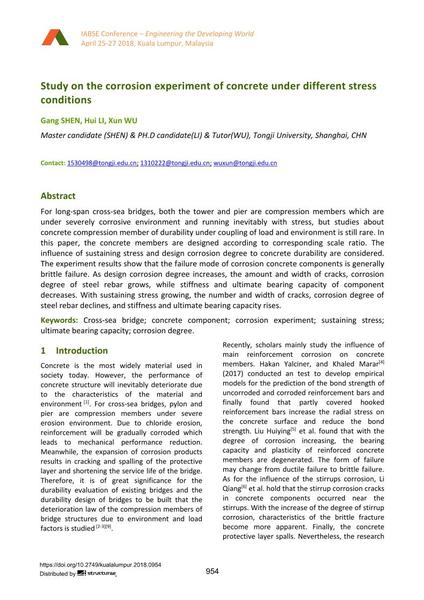Study on the corrosion experiment of concrete under different stress conditions

|
|
|||||||||||
Bibliografische Angaben
| Autor(en): |
Gang Shen
(Master candidate (SHEN) & PH.D candidate(LI) & Tutor(WU), Tongji University, Shanghai, CHN)
Hui Li (Master candidate (SHEN) & PH.D candidate(LI) & Tutor(WU), Tongji University, Shanghai, CHN) Xun Wu (Master candidate (SHEN) & PH.D candidate(LI) & Tutor(WU), Tongji University, Shanghai, CHN) |
||||
|---|---|---|---|---|---|
| Medium: | Tagungsbeitrag | ||||
| Sprache(n): | Englisch | ||||
| Tagung: | IABSE Conference: Engineering the Developing World, Kuala Lumpur, Malaysia, 25-27 April 2018 | ||||
| Veröffentlicht in: | IABSE Conference Kuala Lumpur 2018 | ||||
|
|||||
| Seite(n): | 954-961 | ||||
| Anzahl der Seiten (im PDF): | 8 | ||||
| DOI: | 10.2749/kualalumpur.2018.0954 | ||||
| Abstrakt: |
For long-span cross-sea bridges, both the tower and pier are compression members which are under severely corrosive environment and running inevitably with stress, but studies about concrete compression member of durability under coupling of load and environment is still rare. In this paper, the concrete members are designed according to corresponding scale ratio. The influence of sustaining stress and design corrosion degree to concrete durability are considered. The experiment results show that the failure mode of corrosion concrete components is generally brittle failure. As design corrosion degree increases, the amount and width of cracks, corrosion degree of steel rebar grows, while stiffness and ultimate bearing capacity of component decreases. With sustaining stress growing, the number and width of cracks, corrosion degree of steel rebar declines, and stiffness and ultimate bearing capacity rises. |
||||
